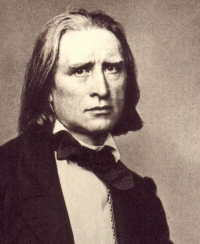Liszt
 Franz Liszt (October 22, 1811 â July 31, 1886) was a Hungarian composer, virtuoso pianist and teacher.
Franz Liszt (October 22, 1811 â July 31, 1886) was a Hungarian composer, virtuoso pianist and teacher.Liszt became renowned throughout Europe for his great skill as a performer; to this day, many consider him to have been the greatest pianist in history. He was also an important and influential composer, a notable piano teacher, a conductor who contributed significantly to the modern development of the art, and a benefactor to other composers and performers, notably Richard Wagner and Hector Berlioz.
As a composer, Liszt was one of the most prominent representatives of the "Neudeutsche Schule" ("New German School"). He left behind a huge and diverse oeuvre, in which he influenced his forward-looking contemporaries and anticipated some 20th-century ideas and trends. Some of his most notable contributions were the invention of the symphonic poem, developing the concept of thematic transformation as part of his experiments in musical form and making radical departures in harmony.
Liszt has most frequently been credited to have been the first pianist who gave concerts with programs consisting only of solo pieces. An example is a concert he gave on March 9, 1839, at the Palazzo Poli in Rome. Since Liszt could not find singers who â following the usual habit of the time â should have completed the program, he played four numbers all alone.
Liszt was a prolific composer. Most of his music is for the piano and much of it requires formidable technique.In his most famous and virtuosic works, he is the archetypal Romantic composer. Liszt pioneered the technique of thematic transformation, a method of development which was related to both the existing variation technique and to the new use of the Leitmotif by Richard Wagner. Liszt's piano works are usually divided into two classes. On the one hand, there are "original works", and on the other hand "transcriptions", "paraphrases" or "fantasies" on works by other composers.
 Liszt Latest Sheets Feed
Liszt Latest Sheets Feed Liszt Latest Requests Feed
Liszt Latest Requests Feed
Advertisement
Advertisement
Total 202 sheet(s) found, listing between 160 - 180.
| Song | Added By | Pages | Instruments | Sheet Type | File |
| Consulations (Tröstungen) (Vigasztalások) |
virror (18)
5319d ago
|
14 | Piano | Other |
|
| liebestraum |
jhnliu (1)
5320d ago
|
4 | Violin | Original |
|
| La campanella |
l7bw4 (11)
5326d ago
|
15 | Piano | Original |
|
| Consolation No.3 |
twinklexin (12)
5329d ago
|
4 | Piano | Original |
|
| Consolation no. 3 |
ninarenhe (5)
5336d ago
|
4 | Piano | Other |
|
| Consolation no. 4 |
ninarenhe (5)
5336d ago
|
2 | Piano | Other |
|
| Consolation no. 1 |
ninarenhe (5)
5336d ago
|
1 | Piano | Other |
|
| Hungarian Rhapsody 2 |
bhg06 (2)
5338d ago
|
43 | Piano | Original |
|
| Grand Galop Chromatique |
rozalinda (1)
5341d ago
|
7 | Piano | Transcription |
|
| liebestraum |
axmauricio (4)
5347d ago
|
3 | Piano | Transcription |
|
| liszat |
graceewong (1)
5348d ago
|
88 | Piano | Original |
|
| Danse Macabre |
digadiga (1)
5355d ago
|
21 | Piano | Other |
|
| mephisto |
12341 (24)
5355d ago
|
29 | Piano | Transcription |
|
| Hungarian Rhapsody No 3 |
triocup (2)
5356d ago
|
4 | Piano | Other |
|
| Hungarian Rhapsody no. 1 |
triocup (2)
5356d ago
|
17 | Piano | Other |
|
| Confutatis y Lacrimosa |
charlychopin (4)
5367d ago
|
8 | Piano | Original |
|
| A Love Dream |
Nuciuccio (1)
5369d ago
|
4 | Piano | Other |
|
| Etude BOOK |
GUYBZ (1)
5370d ago
|
105 | Piano | Original |
|
| La campanella |
janev (4)
5383d ago
|
15 | Piano | Original |
|
| Rapsodia Húngara no.2 (cuatro manos) |
Angel.of.music (14)
5385d ago
|
23 | Piano | Other |
|

